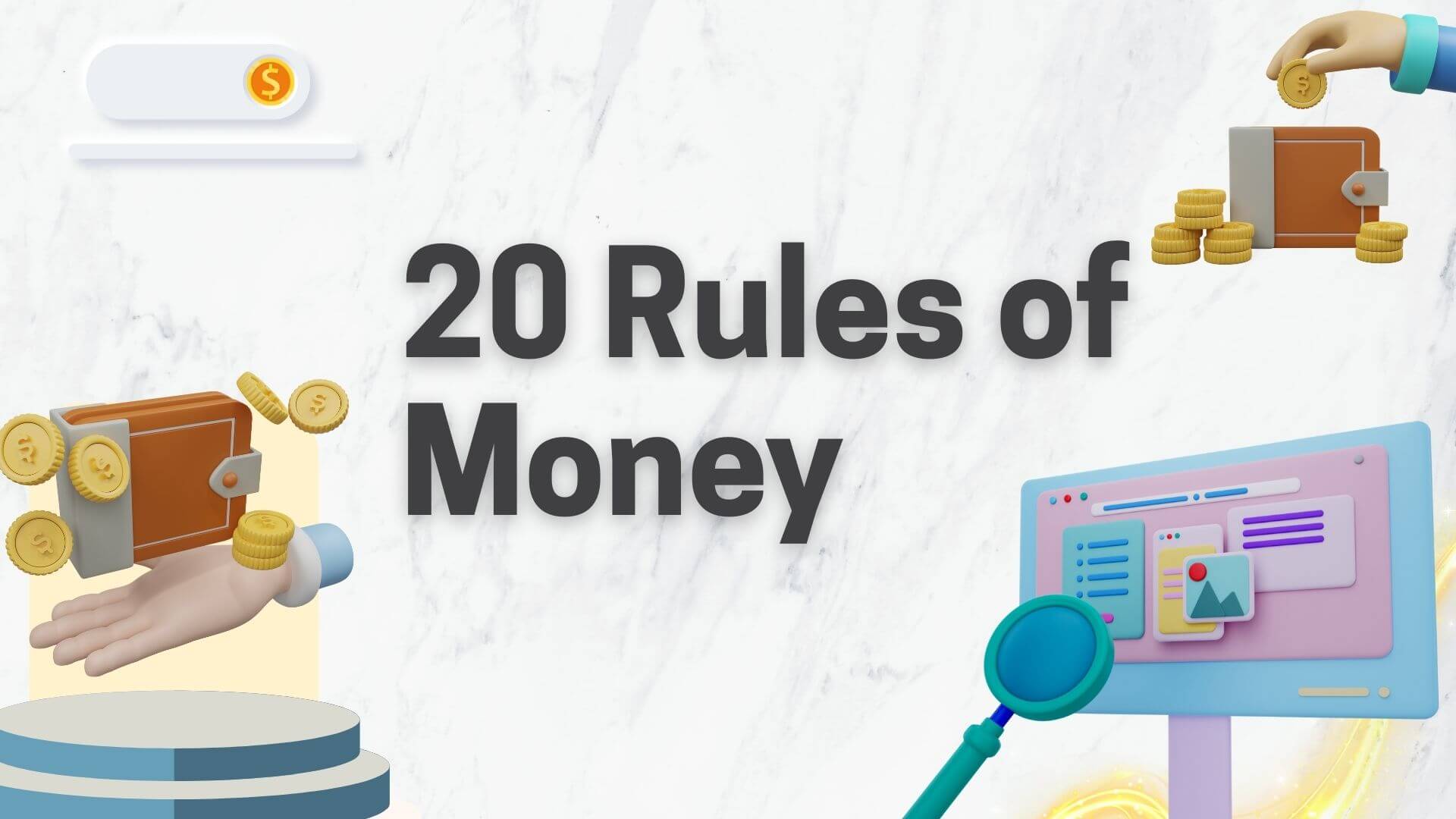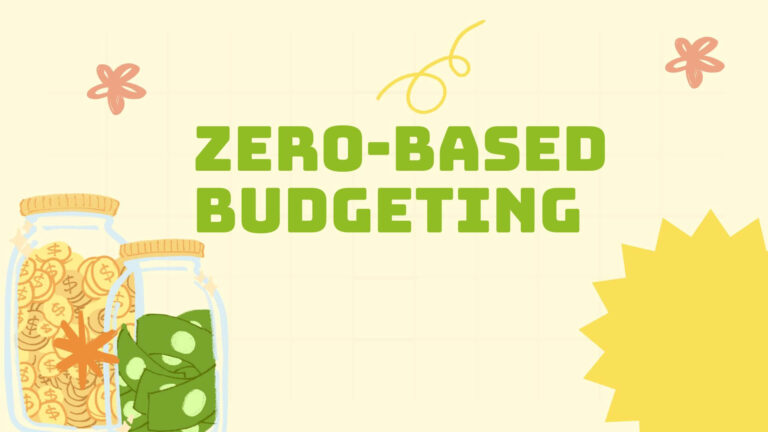20 Rules of Money: How to Win the Money Game
I want you to think about this, in your entire lifetime, how much money has gone through your hands?
Maybe you made $73,000 last year at 28 years old, and your first paycheck was when you were 14 years old for $100. Add it all up and you’ll come out with a number:
- $493,000
- $1.9 million
- $6.3 million
…depending on who’s reading this.
The real question is: how much is left in your wallet?
I’m not talking about “what’s in your wallet” with Capitol Choice. I’m asking: really, what do you have left? How much savings do you have?
If you’re not too happy with that answer, it’s simple: you don’t know how to play the money game. I didn’t either at one point. I made money, and there was nothing left in my pocket. But through experience and mistakes, I learned these rules.
So now, I want to share with you the 20 Rules of Money.

Rule #1: Money Is a Game
Money is a game. And like any game, the more you play, the better you get.
- If you’ve never played chess and face someone who’s played 100 times, you’ll probably lose.
- If you’ve played Monopoly 1,000 times against someone who’s only played three, you’ll probably win.
The same goes for money. People who are rich aren’t magically smarter, they just learned the game. And you can too.
Rule #2: Don’t Be a Hater of Money
If you hate money, you’ll never get it. Money doesn’t like haters.
- If you constantly say things like “money doesn’t grow on trees” or “rich people are greedy,” you’re pushing money away.
- It’s like going on a date and telling someone you dislike everything they represent. Why would they stick around?
Don’t repel money. Attract it.

Rule #3: Money Is a Doubles Game
The entire game of money is about doubling your money.
- If you have $1,000, you’re only 10 doubles away from $1 million.
- 5 doubles = $32,000
- 13 doubles = $8.192 million
Your two keys:
- Risk tolerance – what level of risk can you handle at your age?
- Time horizon – when do you want to hit your goal?
Play the doubles game with these in mind.
Rule #4: Money Is About Seduction
Money is attracted to people who know what they’re doing, not to people who are desperate.
- Just like confidence attracts people, confidence attracts money.
- Don’t let money seduce you. Instead, seduce money by showing you can manage it wisely.
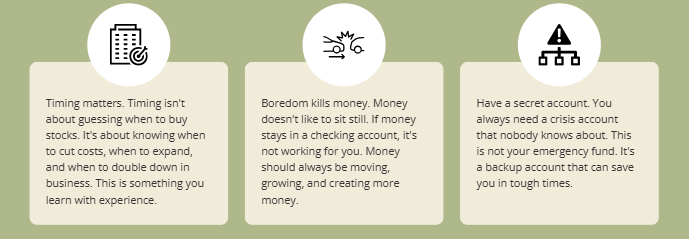
Rule #5: Timing Matters
Timing isn’t about guessing when to buy Snapchat stock. It’s about knowing when to cut costs, when to expand, and when to double down in business.
This is something you learn with experience. Timing your financial decisions can make all the difference.
Rule #6: Boredom Kills Money
Money doesn’t like to sit still.
- If money stays in a checking account, it’s not working for you.
- Money should always be moving, growing, and creating more money.
Rule #7: Have a Secret Account
You always need a crisis account that nobody knows about, not your spouse, family, or friends.
This is not your emergency fund. It’s a backup account that can save you in tough times. It saved my business once when payroll was due, and without it, we would’ve shut down.
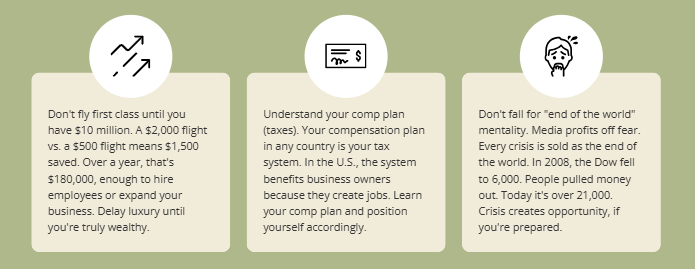
Rule #8: Don’t Fly First Class Until You Have $10 Million
I’m 6’4”, 240 pounds, and I’ve never paid for first class.
- A $2,000 flight vs. a $500 flight means $1,500 saved. Multiply that by 9 flights = $13,500.
- Over a year, that’s $180,000, enough to hire employees or expand your business.
Delay luxury until you’re truly wealthy.
Rule #9: Understand Your Comp Plan (Taxes)
Your compensation plan in any country is your tax system.
- In the U.S., the system benefits business owners because they create jobs.
- If you don’t like your country’s tax system, you either adjust or leave.
Learn your comp plan and position yourself accordingly.
Rule #10: Don’t Fall for “End of the World” Mentality
Media profits off fear. Every crisis is sold as the end of the world.
- 2008: the Dow fell to 6,000. People pulled money out. Today it’s over 21,000.
- If you had cash ready, you could’ve bought assets at a discount.
Crisis creates opportunity, if you’re prepared.
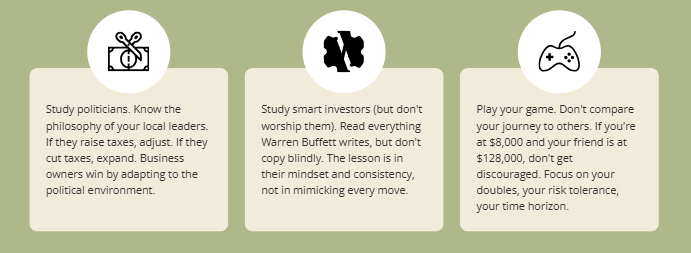
Rule #11: Study Politicians
Know the philosophy of your local leaders.
- If they raise taxes, adjust.
- If they cut taxes, expand.
Business owners win by adapting.
Rule #12: Study Smart Investors (But Don’t Worship Them)
Read everything Warren Buffett writes, but don’t copy blindly.
The lesson is in their mindset and consistency, not in mimicking every move.
Rule #13: Play Your Game
Don’t compare your journey to others.
- If you’re at $8,000 and your friend is at $128,000, don’t get discouraged.
- Focus on your doubles, your risk tolerance, your time horizon.
Your vision might be $2 million, not $200 million. That’s fine. Play your game.

Rule #14: Don’t Obsess Over the Index
I don’t care about beating the S&P index. I care about beating my goals.
Set your deadlines and hit your numbers, not Wall Street’s.

Rule #15: Befriend Money Makers
Spend time with people who know how to make money.
- You’ll pick up their mindset, habits, and opportunities.
- Vet people carefully before going into business with them.

Rule #16: Diversification Is for the Risk-Averse
If you want to grow wealth aggressively, you can’t rely only on diversification.
Diversification is fine if you’re 70+ and protecting assets. But if you’re young and building wealth, focus on multiplying , not just spreading , your money.

Rule #17: Use Leverage
Leverage your:
- Business
- Network
- Systems
- Marketing
- Technology
Leverage speeds up growth.

Rule #18: Positioning Matters
Wealth often comes from being in the right position at the right time.
- Equity in a company.
- Partnerships.
- Strategic seats at the table.
Don’t just earn , position yourself.

Rule #19: Build Strategic Partnerships
The more people who make money with you, the stronger your business.
I’ve partnered with billion dollar companies. Everyone wins, and that’s why the relationship lasts.

Rule #20: Avoid Big Check Syndrome
Don’t get cocky after a big payday.
- A $100,000 real estate commission isn’t $100k/month. It’s $8,300/month over a year.
- Consistent income beats one big check.
Would you rather have $500,000 once, or $100,000 every year for 20 years ($2 million total)? Always think long term.
Summary
These 20 rules aren’t theory. They’re lessons I’ve learned from mistakes and wins.
If you want to study them further, grab the free PDF at PatrickBetDavid.com. Print it out, highlight what you already do well, and focus on improving the areas you don’t.
Money is a game. Learn the rules, play your strategy, and win.

